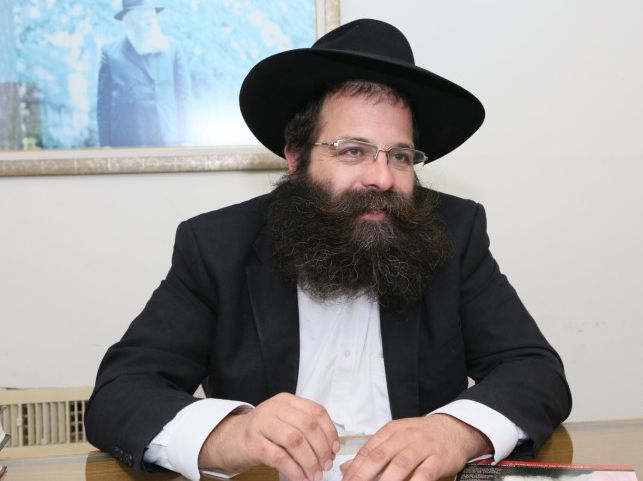REB MOSHE’S APPROACH
R’ Oholiav Abutbul, Director of Beis Moshiach in Eretz Yisroel: My mechanech: R’ Moshe Assoulin
 The beginning was not exactly ordinary or expected. “Close the Gemaras,” we were told by R’ Moshe Assoulin, the teacher of the first-year class (shiur aleph) of yeshiva k’tana (mesivta) Achei T’mimim in Kfar Chabad. It was our first day in yeshiva. The excitement was plain to see on the faces of all thirty students who filled the classroom, and had just bought their first Gemara to be used in their new world, the world of the yeshiva. We were all tensed for our first encounter with the “big boys,” the T’mimim, who were figures to be admired from our exciting days in camp, which had just ended.
The beginning was not exactly ordinary or expected. “Close the Gemaras,” we were told by R’ Moshe Assoulin, the teacher of the first-year class (shiur aleph) of yeshiva k’tana (mesivta) Achei T’mimim in Kfar Chabad. It was our first day in yeshiva. The excitement was plain to see on the faces of all thirty students who filled the classroom, and had just bought their first Gemara to be used in their new world, the world of the yeshiva. We were all tensed for our first encounter with the “big boys,” the T’mimim, who were figures to be admired from our exciting days in camp, which had just ended.
We were so pumped up on the first day of yeshiva that there was not even a momentary sign of tiredness to be seen among us. The adrenaline was at a peak, and we were waiting for it all to begin already. In our imagination, we pictured a serious rebbi with a flowing beard who would inundate us with Gemara concepts that only the greats discuss, and we would be nodding our heads like familiar experts in that world, since after all we were now grown up… In addition, there was the feeling that whoever smiles less is to be considered more mature and more studious.
And then he arrived. We stood up for him upon his entrance in awe and respect, but he asked us to close the Gemaras. I can’t recall word for word what he said, but the gist was quite clear. Here, we are not demanding of you to be what you are not, but to be yourself. This is not a break for beginners or young students; this is what is demanded of you on a daily basis, and every moment of the day—that you utilize your strengths that you have, which express who you are.
In the days that followed, he introduced us, in a gentle way, to the world of complex Talmudic logic. The lengthy classes – two hours straight – fascinated us to an exceptional degree. The desire that burned within him (and continues to burn to this day, just ask his students) for the sweetness of the Gemara, infected all of us. It was impossible to remain apathetic and not dive in with him into the analytic world of Rashi, Tosafos, and the commentaries.
At the end of each month, there was a final exam on all of the material covered in the past month. You can’t compare a test in shiur aleph by R’ Assoulin to the tests in any of the other classes. It was something else entirely. Night after night, he would push us to steal away from the hours of sleep and diligently review the material. With one hand, he would arrange with the night monitor to “look the other way,” and with the other hand, he would surprise those who were still learning at three in the morning with pitas filled with all sorts of goodies.
He didn’t have to ask it of us, but we knew that we did not want to disappoint him by getting a lower mark than on the previous test. Before the test, we would say T’hillim and write to the Rebbe to ask for a bracha. He managed to infect us, young kids 13-14 years old, with seriousness and diligence. The test would take an entire day (and at times, don’t laugh, those who did not finish would come to the living room in his house to complete the test).
That is what the teacher of our class was like.
But more than anything else, the line that was branded deeply into me, is the one that he said at the conclusion of that first class, “I am here to not go easy on you.”
From the very first instant he stuck to his word. Not even for a fraction of a second did he go easy on us.
During the learning session, when we were all sitting in the main study hall trying to review what we had learned in class, he would continue to work. He would go from one pair of study partners to the next. Seeing to it that the boy who was less familiar with the subject matter should learn with one who already had it clear. Moving and refitting pieces like with Lego, making matches and breaking up pairs, absolutely prohibiting us from sitting next to someone on the same level.
It did not budge him in the least when we would get angry at him or make an annoyed face because he had broken up a pair. To him this was the ABC of a Tamim in a Chabad yeshiva, to be concerned for a friend that didn’t quite get the subject matter.
With time, I came to appreciate him all the more, for this trait of not giving in to anyone and especially not giving up on anyone.
 September 6, 2017
September 6, 2017
Reader Comments